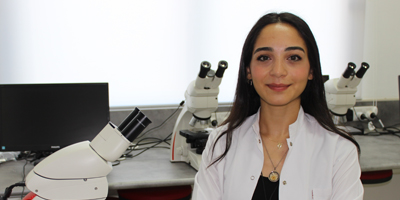AIDS is one of the most important public health problems worldwide

Virus can be controlled with effective antiretroviral (ARV) drugs
Academician of European University of Lefke (EUL) Vocational School of Health Sciences Assist. Prof. Dr. Yağmur Ekenoğlu made some statements on AIDS and conveyed detailed information.
Ekenoğlu said that “AIDS, which is the most feared disease among infectious diseases today, is one of the most important public health problems in the world with its social consequences such as being widespread and with its individual consequences” and pointed out that HIV infection, which was first described in the 1980s, continues to spread and that nearly one million people worldwide die each year due to the HIV virus.
HIV targets the immune system
She said that “Acquired Immunodeficiency Syndrome (AIDS) is a disease caused by ‘Human Immunodeficiency Virus’ (HIV). HIV targets the immune system and makes the body’s defence systems susceptible to infections and certain types of cancer” and added that World Health Organization declared World Health Day on December 1 in 1994 to draw global attention to support, participation and cooperation in efforts against HIV infections and AIDS. Ekenoğlu said that according to the World Health Organization (WHO), 37.9 million people are infected with HIV in the world and 770,000 people died due to HIV in 2018 and 1.7 million people are newly infected. Underlining that there isn’t any exact cure for HIV infection, Ekenoğlu said that “However, with effective antiretroviral (ARV) drugs, the virus can be controlled and transmission can be prevented. The average life expectancy of HIV-positive individuals is brought closer to the life expectancy of healthy individuals with regular drug treatment. The first condition is that treatment of HIV / AIDS patients should be started as early as possible”. Underlining that for early diagnosis and treatment, in case of doubt, risk testing and consultation with a doctor should not be hesitated, Ekenoğlu stated that the names of people with HIV infection should be kept confidential. She also said that “The name of the patient must not be used before the test and in case of positive results and the information about the personal life of the patient must be kept confidential”.
In order to be protected from the disease, the ways of transmission and prevention must be learned and awareness should be created.
Pointing out that the most effective way of preventing AIDS is protection, Ekenoğlu said that in order to be protected from the disease, the ways of transmission and prevention must be learned and awareness should be created. She further stated that HIV can be transmitted through body fluids of infected people, such as blood and breast milk, and from an HIV-positive mother to the baby during pregnancy, during labour or during breastfeeding and added that the HIV virus cannot transmitted by regular daily contacts such as kissing, embracing, handshaking or sharing personal items, food, water.
Early diagnosis is very important for effective treatment
Pointing out that the HIV virus does not always conclude with AIDS, Ekenoğlu said that “The development of AIDS in HIV-positive individuals may take from 2 to 15 years, depending on the individual. Early diagnosis is very important in terms of effective treatment of the person and prevention of transmission of people who are carriers and people who are not aware of the disease in the society”.
Early diagnosis and protection is important in AIDS
Ekenoğlu finally said that “Increasing social awareness is of utmost importance in order to ensure early diagnosis and protection. HIV testing and early treatment should be made widespread. In order to control HIV / AIDS in the society, all segments of the society, especially health managers and healthcare workers, should have sufficient knowledge and understanding of the importance of HIV and AIDS. In addition, the prevention of unnecessary prejudices and concerns can only be achieved through a comprehensive fight against discrimination”.
